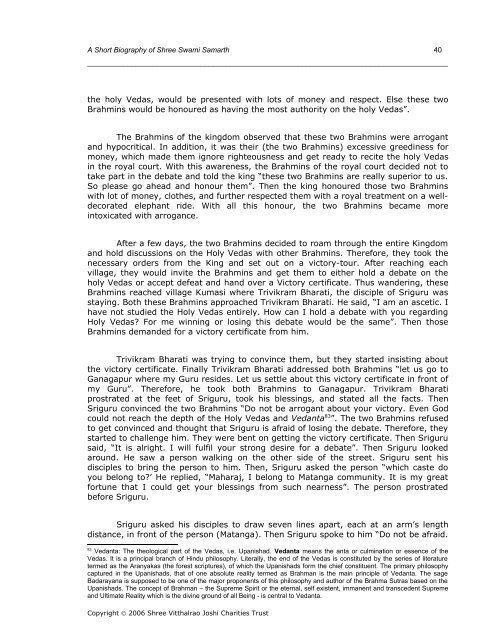Shree Swami Samarth Maharaj
Shree Swami Samarth Maharaj
Shree Swami Samarth Maharaj
You also want an ePaper? Increase the reach of your titles
YUMPU automatically turns print PDFs into web optimized ePapers that Google loves.
A Short Biography of <strong>Shree</strong> <strong>Swami</strong> <strong>Samarth</strong> 40<br />
_________________________________________________________________________________________<br />
the holy Vedas, would be presented with lots of money and respect. Else these two<br />
Brahmins would be honoured as having the most authority on the holy Vedas”.<br />
The Brahmins of the kingdom observed that these two Brahmins were arrogant<br />
and hypocritical. In addition, it was their (the two Brahmins) excessive greediness for<br />
money, which made them ignore righteousness and get ready to recite the holy Vedas<br />
in the royal court. With this awareness, the Brahmins of the royal court decided not to<br />
take part in the debate and told the king “these two Brahmins are really superior to us.<br />
So please go ahead and honour them”. Then the king honoured those two Brahmins<br />
with lot of money, clothes, and further respected them with a royal treatment on a welldecorated<br />
elephant ride. With all this honour, the two Brahmins became more<br />
intoxicated with arrogance.<br />
After a few days, the two Brahmins decided to roam through the entire Kingdom<br />
and hold discussions on the Holy Vedas with other Brahmins. Therefore, they took the<br />
necessary orders from the King and set out on a victory-tour. After reaching each<br />
village, they would invite the Brahmins and get them to either hold a debate on the<br />
holy Vedas or accept defeat and hand over a Victory certificate. Thus wandering, these<br />
Brahmins reached village Kumasi where Trivikram Bharati, the disciple of Sriguru was<br />
staying. Both these Brahmins approached Trivikram Bharati. He said, “I am an ascetic. I<br />
have not studied the Holy Vedas entirely. How can I hold a debate with you regarding<br />
Holy Vedas? For me winning or losing this debate would be the same”. Then those<br />
Brahmins demanded for a victory certificate from him.<br />
Trivikram Bharati was trying to convince them, but they started insisting about<br />
the victory certificate. Finally Trivikram Bharati addressed both Brahmins “let us go to<br />
Ganagapur where my Guru resides. Let us settle about this victory certificate in front of<br />
my Guru”. Therefore, he took both Brahmins to Ganagapur. Trivikram Bharati<br />
prostrated at the feet of Sriguru, took his blessings, and stated all the facts. Then<br />
Sriguru convinced the two Brahmins “Do not be arrogant about your victory. Even God<br />
could not reach the depth of the Holy Vedas and Vedanta 83 ”. The two Brahmins refused<br />
to get convinced and thought that Sriguru is afraid of losing the debate. Therefore, they<br />
started to challenge him. They were bent on getting the victory certificate. Then Sriguru<br />
said, “It is alright. I will fulfil your strong desire for a debate”. Then Sriguru looked<br />
around. He saw a person walking on the other side of the street. Sriguru sent his<br />
disciples to bring the person to him. Then, Sriguru asked the person “which caste do<br />
you belong to?’ He replied, “<strong>Maharaj</strong>, I belong to Matanga community. It is my great<br />
fortune that I could get your blessings from such nearness”. The person prostrated<br />
before Sriguru.<br />
Sriguru asked his disciples to draw seven lines apart, each at an arm’s length<br />
distance, in front of the person (Matanga). Then Sriguru spoke to him “Do not be afraid.<br />
83 Vedanta: The theological part of the Vedas, i.e. Upanishad. Vedanta means the anta or culmination or essence of the<br />
Vedas. It is a principal branch of Hindu philosophy. Literally, the end of the Vedas is constituted by the series of literature<br />
termed as the Aranyakas (the forest scriptures), of which the Upanishads form the chief constituent. The primary philosophy<br />
captured in the Upanishads, that of one absolute reality termed as Brahman is the main principle of Vedanta. The sage<br />
Badarayana is supposed to be one of the major proponents of this philosophy and author of the Brahma Sutras based on the<br />
Upanishads. The concept of Brahman – the Supreme Spirit or the eternal, self existent, immanent and transcedent Supreme<br />
and Ultimate Reality which is the divine ground of all Being - is central to Vedanta.<br />
Copyright © 2006 <strong>Shree</strong> Vitthalrao Joshi Charities Trust


